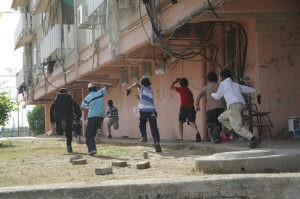 After five days of Operation Pillar of Defense, it is hardly a surprise that there’s a palpable tension. It has two parts. One, very immediate and direct, is triggered every time the alarm is sounded. For over a million Israelis living in the south, this unwelcome experience is repeated 7-10 times a day. The other is the looming prospect of a ground war, which Israelis seem to feel is unavoidable. The challenge of fighting in a crowded urban environment is well known to the Israeli military, both in terms of keeping its losses to a minimum and in terms of dealing its incredible efforts to limit civilian casualties.
After five days of Operation Pillar of Defense, it is hardly a surprise that there’s a palpable tension. It has two parts. One, very immediate and direct, is triggered every time the alarm is sounded. For over a million Israelis living in the south, this unwelcome experience is repeated 7-10 times a day. The other is the looming prospect of a ground war, which Israelis seem to feel is unavoidable. The challenge of fighting in a crowded urban environment is well known to the Israeli military, both in terms of keeping its losses to a minimum and in terms of dealing its incredible efforts to limit civilian casualties.
I won’t pretend that I can fully relate to the stress of the next alarm. But maybe I got a small taste of it during our security briefing in advance of our visit tomorrow to the south. Our security director made it very clear: every second counts. We will be in the area of 15-30 second warning. We will not be cleared to depart for the south unless our group of 20 passes a bus evacuation drill tomorrow morning — we have to be out of the bus and hugging the ground within 15 seconds.
For security reasons, I can’t reveal details of our plan for our visit to the south. I can say we will be in areas that are under fire. We will visit places that have been hit, people who have been wounded and new immigrants who began their new lives in Israel under fire.
What is evident is the resilience and matter-of-fact attitude of most Israelis. Yes, they are stressed. Yes, they are worried about the cost of a ground war. And yet Israelis are committed to going about their business. As the falafel guy said to me, “Ma La’asot (“what can you do”?).
This is a guest post by Minneapolis Jewish Federation CEO Steve Silberfarb. He is in Israel this week along with other Jewish leaders. He has promised to write what he can, as much as time and security will allow. Check back here for more updates, and follow @silberfarb for even more!
(Photo: IDFOnline)



1 comment